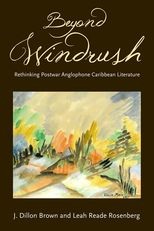Beyond Windrush: Rethinking Postwar Anglophone Caribbean Literature
Beyond Windrush: Rethinking Postwar Anglophone Caribbean Literature
Cite
Abstract
The first book to critically redefine and reexamine West Indian literature of the 1950s, Beyond Windrush challenges the myth that an elite cohort of male novelists based in postwar London single-handedly produced Anglophone Caribbean literature and broadens our understanding of Caribbean and Black British literary history. Writers of this cohort, often reduced to George Lamming, V.S. Naipaul, and Sam Sevlon, are referred to “the Windrush writers,” in tribute to the S.S. Empire Windrush, whose 1948 voyage from Jamaica inaugurated the large-scale Caribbean migration to London. They have been properly celebrated for producing a complex, anti-colonial, nationalist literary tradition, but, as this collection demonstrates, their uncritical canonization has obscured the diversity of postwar Caribbean writers and produced a narrow definition of West Indian literature. The fourteen original essays in this collection here make clear that already in the 1950s a wide spectrum of West Indian men and women—Afro-Caribbean, Indo-Caribbean and white-creole—were writing, publishing (and even painting)—and that many were in the Caribbean, Canada, and the United States, rather than London. Moreover, they addressed subjects omitted from the masculinist canon, such as queer sexuality and the environment. The collection offers new readings of canonical authors (Lamming, Roger Mais, and Andrew Salkey); hitherto marginalized authors (such as Ismith Khan, Elma Napier, and John Hearne); commonly ignored genres (such as the memoir, short stories, and journalism); as well as alternative units of cultural and political unity, such as the Pan-Caribbean as well as potentially trans-hemispheric, trans-island conceptions of political identity.
-
Front Matter
-
Introduction: Looking Beyond Windrush
J. Dillon Brown andLeah Reade Rosenberg
-
Part One Negotiating National Belonging
-
Part Two Genre and Gender
-
Part Three The Politics of Literary Production and Reception
-
Part Four Alternate Geographies
-
Kingston Calling: Mais’s Paris, 1954
Faith Smith
-
Marie Chauvet and the Writer’s Exile from the Postcolonial Public Sphere
Raphael Dalleo
-
Beyond Windrush and the Original Black Atlantic Routes: Austin Clarke, Race, and Canada’s Influence on Anglophone Caribbean Literature
Michael A. Bucknor
-
Federated Ocean States: Archipelagic Visions of the Third World at Midcentury
Michelle A. Stephens
-
Epilogue: Coming of Age in the Fifties
Edward Baugh
-
Kingston Calling: Mais’s Paris, 1954
-
End Matter
Sign in
Personal account
- Sign in with email/username & password
- Get email alerts
- Save searches
- Purchase content
- Activate your purchase/trial code
Institutional access
-
Sign in through your institution
- Sign in with a library card Sign in with username/password Recommend to your librarian
Institutional account management
Sign in as administratorPurchase
Our books are available by subscription or purchase to libraries and institutions.
Purchasing information| Month: | Total Views: |
|---|---|
| November 2022 | 2 |
| April 2023 | 6 |
| June 2023 | 2 |
| June 2023 | 2 |
| July 2023 | 2 |
| July 2023 | 2 |
| August 2023 | 1 |
| August 2023 | 2 |
| August 2023 | 2 |
| August 2023 | 2 |
| October 2023 | 1 |
| October 2023 | 2 |
| November 2023 | 1 |
| December 2023 | 3 |
| January 2024 | 1 |
| February 2024 | 1 |
| February 2024 | 2 |
| February 2024 | 1 |
| February 2024 | 4 |
| February 2024 | 1 |
| March 2024 | 1 |
| March 2024 | 3 |
| April 2024 | 1 |



Get help with access
Institutional access
Access to content on Oxford Academic is often provided through institutional subscriptions and purchases. If you are a member of an institution with an active account, you may be able to access content in one of the following ways:
IP based access
Typically, access is provided across an institutional network to a range of IP addresses. This authentication occurs automatically, and it is not possible to sign out of an IP authenticated account.
Sign in through your institution
Choose this option to get remote access when outside your institution. Shibboleth/Open Athens technology is used to provide single sign-on between your institution’s website and Oxford Academic.
If your institution is not listed or you cannot sign in to your institution’s website, please contact your librarian or administrator.
Sign in with a library card
Enter your library card number to sign in. If you cannot sign in, please contact your librarian.
Society Members
Society member access to a journal is achieved in one of the following ways:
Sign in through society site
Many societies offer single sign-on between the society website and Oxford Academic. If you see ‘Sign in through society site’ in the sign in pane within a journal:
If you do not have a society account or have forgotten your username or password, please contact your society.
Sign in using a personal account
Some societies use Oxford Academic personal accounts to provide access to their members. See below.
Personal account
A personal account can be used to get email alerts, save searches, purchase content, and activate subscriptions.
Some societies use Oxford Academic personal accounts to provide access to their members.
Viewing your signed in accounts
Click the account icon in the top right to:
Signed in but can't access content
Oxford Academic is home to a wide variety of products. The institutional subscription may not cover the content that you are trying to access. If you believe you should have access to that content, please contact your librarian.
Institutional account management
For librarians and administrators, your personal account also provides access to institutional account management. Here you will find options to view and activate subscriptions, manage institutional settings and access options, access usage statistics, and more.